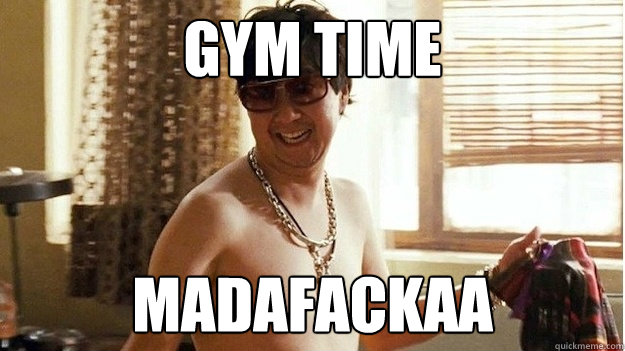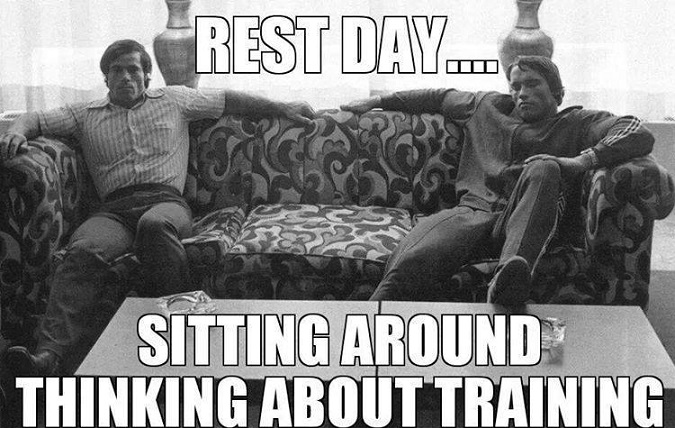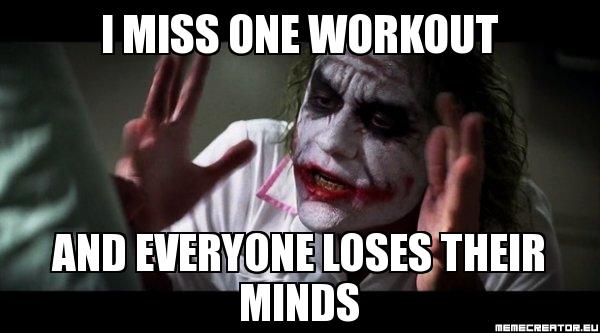He felt panic stricken. What was he going to do? He spent at least seven hours a week, every week for the last eleven months working to increase is bench and add more muscle. At nineteen years old he was at his peak (so he thought) and this upcoming week was about to squash all the work he’d put in. The same thing happened to him last year during the same week so you thought he would have learned by now.
It was June and he was home from college for the summer. As a lacrosse player, he loved the sport but loved training more. The hours spent in the gym smashing personal bests gave him more satisfaction than scoring goals.
That’s what made this week so hard. There would not be a single minute for him to spend in the gym. The lacrosse camp he was a coach and counselor at for this one week each June was massive—thousands of kids. And with so many kids running around on and off the field there was not a spare minute in the day.
Not being able to train ate way at him every day.
He was excited when day six finally arrived. Time to go home!
He walked in the door said a quick hello to his parents and within minutes he was back out the door, in the car, and heading to the gym.

He got under the bench for his first couple of warm-up sets.
“Whoa, that felt easy” he thought to himself.
And then he moved onto his working set. With one-eighty-five on the bar he was expecting to push out his usual six reps. But after he completed eight it hit him that the week off didn’t hurt him one bit.
Not the type to put two and two together he just thought how “lucky” he was to have not lost any strength. Never mind that he just bested his last four bench press workouts.
What can I say, I’m a slow learner. 
People get neurotic about their training.
We all agree, a healthy commitment to exercise and nutrition is great. But when a commitment turns into an obsession—usually in the case of body dysmorphic disorders—it’s never a pretty sight. I would not go so far to say I suffered from a disorder (I always maintained some sensibility about how I looked) mine was more of a compulsion.
I worked hard, earned my gains and yearned for more. I would guess you and I are probably similar that way. It’s very normal to be concerned that too much time away from the gym will result in regression.
But…
Is all the unrest we feel about time away from the gym warranted?
If we rely on the empirical evidence the answer is, no.
If rely on the research, the answer is still, no.
Research published in the European Journal of Applied Physiology in 2013 (Ogasawara R1, Yasuda T, Ishii N, Abe T.) [1] compared the effects of a periodic resistance training (PTR) program with those of a continuous resistance training (CTR) program on muscle size and function.
The CTR group trained continuously over a 24-week period, whereas the PTR group performed three cycles of 6-week training (or retraining), with 3-week detraining periods between training cycles. After an initial 6 weeks of training, increases in cross-sectional area (CSA) of the triceps brachii and pectoralis major muscles and maximum isometric voluntary contraction of the elbow extensors and 1-RM were similar between the two groups.
In the CTR group, muscle CSA and strength gradually increased during the initial 6 weeks of training. However, the rate of increase in muscle CSA and 1-RM decreased gradually after that.
In the PTR group, increase in muscle CSA and strength during the first 3-week detraining/6-week retraining cycle were similar to that in the CTR group during the corresponding period. However, increase in muscle CSA and strength during the second 3-week detraining/6-week retraining cycle were significantly higher in the PTR group than in the CTR group.
Thus, overall improvements in muscle CSA and strength were similar between the groups. The results indicate that 3-week detraining/6-week retraining cycles result in muscle hypertrophy similar to that occurring with continuous resistance training after 24 weeks.
Another study from 2000; Neuromuscular adaptation during prolonged strength training, detraining and re-strength-training in middle-aged and elderly people (Häkkinen K1, Alen M, Kallinen M, Newton RU, Kraemer WJ) [2] provides further evidence that 3 weeks of not training will have an inconsequential impact on muscular size and strength.
According to the researchers findings: Short-term detraining (3 weeks) led to only minor changes, while prolonged detraining (24 weeks) resulted in muscle atrophy and decreased voluntary strength…
Barring injury or some traumatic event anyone moderately committed to maintaining their fitness is unlikely to miss 24 straight weeks of training.
More is to be gained, not lost, from detraining.
Most encouraging about this study and confirmed by others [3,4] is that there is no inhibition of muscular or strength adaptations upon returning to training. But all of us life-long lifters already recognized this, we call it “Muscle Memory.”

In fact in many instances results upon re-training after a week or two of detraining exceeded previous bests. This was my experience at nineteen after returning from a [forced] week off from training. And the scenario has played out hundreds of other times with personal training clients who—fearful that the past 4 months of progress would be wiped away by their upcoming two week vacation—would come back stronger and sometimes looking better.
We shouldn’t be surprise when we consider the effect continuous training can have on the Central Nervous System (CNS) and General Adaptation Syndrome (GAS), as well as how it can blunt anabolic signaling. Taking a week or more off can help all of our physiological systems fully recover and desensitize us to training. All of which are necessary for long-term gains.
Periodization has shown us the way.
As someone who is focused primarily on muscle hypertrophy and building functional strength, and not demonstrating strength (as in the case of a powerlifter or O-lifter), I’m not a big fan of Western Periodization. However, conceptually, it’s spot on. Especially when you view it through the prism of the GAS.

Periods of exercise stress must be followed by periods of rest so the body can overcompensate for and adapt to the stress. In the same way Western Periodization breaks up your training into cycles that focus on a particular adaptation, you want to have specified periods of increased or varied training demands accompanied by periods of lesser demands and layoffs.
As I’ve mentioned many times before, almost to the point of sounding like an iPod stuck on repeat—building muscle is metabolically demanding. Our body will seek out any way, other than building muscle, to increase strength and contend with the demands placed on it through exercise.
That’s why a linear training and recovery model is only beneficial to advanced trainees striving to maintain their gains.
The more our intensity, volume, frequency, method of rep/set performance, exercise selection, etc. remains the same the more sensitized we become to it. The stubborn nineteen year old couldn’t wrap his thick skull around the idea that time away from the gym is good for gains.

But that’s not to say there are not legitimate concerns about detraining.
The two that most quickly jumps to mind for those aesthetically ambitious is fat accumulation resulting from diminished activity and a loss of muscle fullness.
However these are concerns that can easily be addressed and rectified:
To avoid fat gain requires a simple recalculation in caloric intake. Accounting for the calories you won’t be burning through exercise while remaining at or below your maintenance levels will impede any potential fat storage. …Simply solution to a simple problem.
Next, loss of muscle fullness is the result of glycogen degradation. Meaning your muscles are not overcompensating for the glycogen depleted during muscular contractions. This trend reverses immediately upon returning to training.
If you’re taking a week off from training this change is nearly unnoticeable. But if you plan to take more than one week off from purposeful training then you might implement one or two very light workouts a week in which you get a moderate pump, deplete some glycogen, but do not disrupt systemic recovery.
Aside from unease about potential aesthetic deviations the only other observed negative effect in some studies (and validated through personal experience) is a short lived decrease in metabolic conditioning. Upon resuming training subjects/clients fatigued after fewer exercises than is typical or required slightly longer rest between exercises. In my experience most trainees regain their previous level of conditioning after 1-4 workouts.
One step back and two steps forward.
As much evidence as there is to support detraining it should be understood that it is not a license to fly by the seat of your pants. These periods must be planned. They should be built around periods of heavy demands so you can take advantage of heightened anabolic signaling (5) and desensitization to training on the frontend (like when you were a beginner and made rapid gains) and unimpeded recovery on the backend so you can overcompensate and adapt to the demands.
The question is: are you willing to give little in order to get a little more?
References:
1. Ogasawara R1, Yasuda T, Ishii N, Abe T. Comparison of muscle hypertrophy following 6-month of continuous and periodic strength training. Eur J Appl Physiol. 2013 Apr;113(4):975-85. doi: 10.1007/s00421-012-2511-9. Epub 2012 Oct 6.
2. Häkkinen K1, Alen M, Kallinen M, Newton RU, Kraemer WJ. Neuromuscular adaptation during prolonged strength training, detraining and re-strength-training in middle-aged and elderly people. Eur J Appl Physiol. 2000 Sep;83(1):51-62.
3. . Ogasawara R1, Yasuda T, Sakamaki M, Ozaki H, Abe T. Effects of periodic and continued resistance training on muscle CSA and
strength in previously untrained men. Clin Physiol Funct Imaging. 2011 Sep;31(5):399-404. doi: 10.1111/j.1475-097X.2011.01031.x. Epub 2011 May 31
4. Bruusgaard JC, Johansen IB, Egner IM, Rana ZA, Gundersen K. Myonuclei acquired by overload exercise precede hypertrophy and are not lost on detraining. Proc Natl Acad Sci U S A. 2010 Aug 24;107(34):15111-6. doi: 10.1073/pnas.0913935107. Epub 2010 Aug 16
5. Ogasawara R1, Kobayashi K, Tsutaki A, Lee K, Abe T, Fujita S, Nakazato K, Ishii N. mTOR signaling response to resistance exercise is altered by chronic resistance training and detraining in skeletal muscle. J Appl Physiol (1985). 2013 Apr;114(7):934-40. doi: 10.1152/japplphysiol.01161.2012. Epub 2013 Jan 31
_____________________________________________________________________
Thanks for reading this far. If you found this information useful please share it. I’d greatly appreciate it! 

